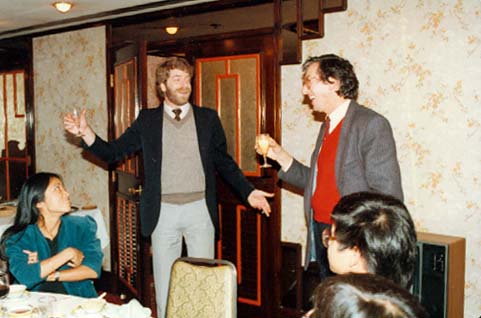Saturday, June 21, 2008
Jay Branegan: Mackler saw journalism as a vehicle to teach life skills
Peter created the curriculum for something close to his heart that he called "Project Plato." It was an introductory course in journalism for high school students. But Peter envisioned it as teaching "life skills" to kids, particularly underprivileged kids in Washington, DC. He felt that even if you're not going to become a journalist, you need to be able to write clearly, to read critically, to know how to do research, to know how to formulate questions, talk to strangers and people of influence, how to organize material, how to assess the information you have.
He sold this idea to a very well-known magnet school in Georgetown, the Duke Ellington School of the Arts. Peter, while holding down a fulltime job, taught this course two days a week to high schoolers in the school's writing program, with the mission of putting out an online magazine. And the kids were expected to report real stories in the real world (this was right after 9/11, so they did stuff related to that, issues about race and young people (historically black colleges), etc.) This notion that the kids could do stories they were really interested in raised the kids' enthusiasm to a whole new level. Peter was great with the students -- watching him in that classroom raised enormously my already-high respect for him.
But Peter had big plans for Project Plato--he constructed as a kind of module, that could be taught anywhere, and delivered as a package. And he thought it would be very valuable in developing countries. He had discussions with folks from the World Bank who were interested in using it for an education program in Africa. Plato, at least at Duke Ellington, didn't surive his transfer back to France, but I think he still had it in the back of his mind. In my mind, Plato was the progenitor for GMF -- teaching journalism in an international forum. And I suspect he probably hoped to use GMF to find some new homes for Plato.
He developed and taught the high school journalism course, Project Plato, for underprivilged students in Washington, based on the premise that reporting and writing can teach important life skills to young people.
-- Jay Branegan
He sold this idea to a very well-known magnet school in Georgetown, the Duke Ellington School of the Arts. Peter, while holding down a fulltime job, taught this course two days a week to high schoolers in the school's writing program, with the mission of putting out an online magazine. And the kids were expected to report real stories in the real world (this was right after 9/11, so they did stuff related to that, issues about race and young people (historically black colleges), etc.) This notion that the kids could do stories they were really interested in raised the kids' enthusiasm to a whole new level. Peter was great with the students -- watching him in that classroom raised enormously my already-high respect for him.
But Peter had big plans for Project Plato--he constructed as a kind of module, that could be taught anywhere, and delivered as a package. And he thought it would be very valuable in developing countries. He had discussions with folks from the World Bank who were interested in using it for an education program in Africa. Plato, at least at Duke Ellington, didn't surive his transfer back to France, but I think he still had it in the back of his mind. In my mind, Plato was the progenitor for GMF -- teaching journalism in an international forum. And I suspect he probably hoped to use GMF to find some new homes for Plato.
He developed and taught the high school journalism course, Project Plato, for underprivilged students in Washington, based on the premise that reporting and writing can teach important life skills to young people.
-- Jay Branegan
Subscribe to:
Comments (Atom)








